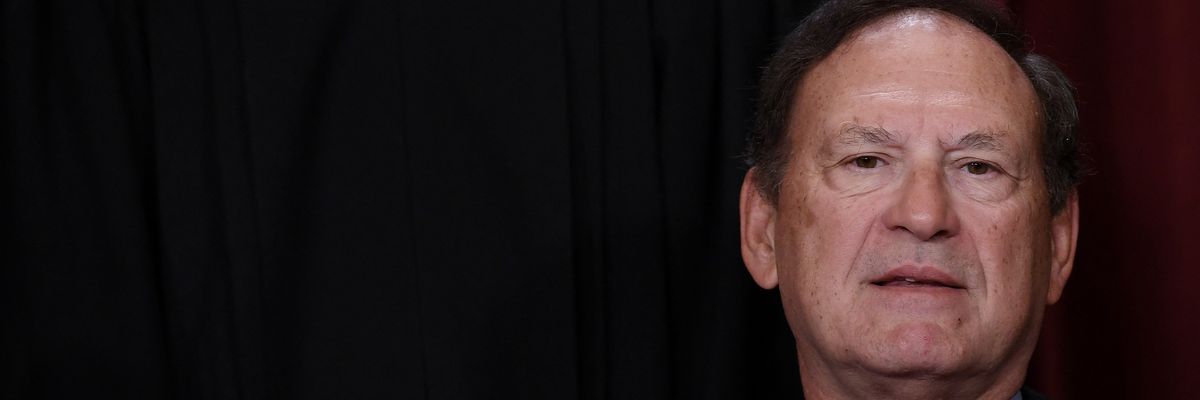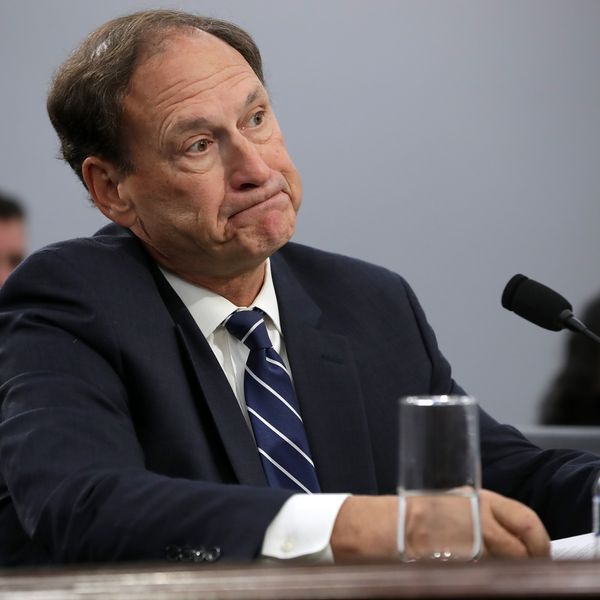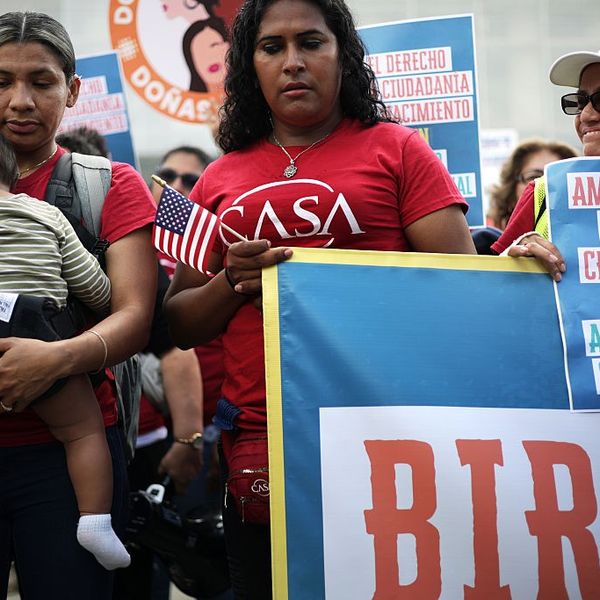
U.S. Supreme Court Justice Samuel Alito poses for a photo at the Supreme Court in Washington, D.C. on October 7, 2022.
Alito Renews Threat to Overturn Marriage Equality
"Overturning Obergefell is on their bucket list," said one journalist.
Trial attorneys in the U.S. frequently stop potential jurors from serving on cases based on their stated biases, but U.S. Supreme Court Justice Samuel Alito indicated on Tuesday that he was disturbed by a case out of Missouri in which three people were eliminated from a jury after expressing homophobic views—and suggested the high court should reconsider marriage equality to prevent such outcomes.
The Supreme Court declined to take up Missouri Department of Corrections v. Jean Finney, with none of the justices dissenting. But Alito appeared reluctant in his agreement with the other eight justices and released a five-page statement saying the case "exemplifies the danger that I anticipated in Obergefell v. Hodges," the 2015 case in which the court ruled 5-4 that same-sex couples in the U.S. had the same right to marry as heterosexual couples.
The case out of Missouri on Tuesday centered on Jean Finney, who said she faced discrimination at the state Department of Corrections (DOC) after she began a relationship with another woman.
During her court case, Finney's lawyer questioned potential jurors about their views on same-sex couples to ensure they didn't harbor a bias against the plaintiff.
The lawyer asked the potential jurors, "How many of you went to a religious organization growing up where it was taught that people that are homosexuals shouldn't have the same rights as everyone else because it was a sin with what they did?"
Three people were eliminated from consideration after stating they believed homosexuality to be a sin.
The jury ultimately sided with Finney in her case, and the state DOC asked for a re-trial, claiming the potential jurors' 14th Amendment right to equal protection under the law had been violated.
After the state Supreme Court declined to take up the case, Missouri Attorney General Andrew Bailey, a Republican, asked the U.S. Supreme Court to review it.
The case, said Alito in his statement, showed that "Americans who do not hide their adherence to traditional religious beliefs about homosexual conduct will be 'labeled as bigots and treated as such' by the government."
The Obergefell ruling "made it clear that the decision should not be used" to discriminate against people for their religious views, wrote Alito, "but I am afraid that this admonition is not being heeded by our society."
Alito's comments come less than two years after Supreme Court Justice Clarence Thomas, also a member of the court's right-wing majority, signaled that the court should reconsider a number of rulings, including Obergefell and a case that guaranteed the right to contraception, following its overturning of Roe v. Wade.
Both Alito and Thomas dissented in Obergefell, arguing the ruling had no basis in the U.S. Constitution. In defense of a Kentucky clerk who refused to issue marriage licenses to gay couples in 2020, the two justices said the decision must be overturned to protect Americans from Obergefell's "cavalier treatment of religion."
"Overturning Obergefell is on their bucket list," said journalist Annika Brockschmidt of the right-wing justices.
At Slate, journalist Mark Joseph Stern noted on Tuesday that Alito's "sudden concern with the striking of a juror due to bias is especially jarring in light of his persistent cold shoulder toward those who faced openly racist juries."
In 2022, the court's right-wing majority rejected an appeal from Kristopher Love, a Black man who was sentenced to death by a jury that included at least one member who believed people of some races "tend to be more violent than others."
"In theory, the equal protection clause bars racism in jury selection," wrote Stern. "In practice, this Supreme Court regularly declines to enforce this guarantee—most often, when a Black defendant faces the death penalty—with Alito's assent."
An Urgent Message From Our Co-Founder
Dear Common Dreams reader, The U.S. is on a fast track to authoritarianism like nothing I've ever seen. Meanwhile, corporate news outlets are utterly capitulating to Trump, twisting their coverage to avoid drawing his ire while lining up to stuff cash in his pockets. That's why I believe that Common Dreams is doing the best and most consequential reporting that we've ever done. Our small but mighty team is a progressive reporting powerhouse, covering the news every day that the corporate media never will. Our mission has always been simple: To inform. To inspire. And to ignite change for the common good. Now here's the key piece that I want all our readers to understand: None of this would be possible without your financial support. That's not just some fundraising cliche. It's the absolute and literal truth. We don't accept corporate advertising and never will. We don't have a paywall because we don't think people should be blocked from critical news based on their ability to pay. Everything we do is funded by the donations of readers like you. Will you donate now to help power the nonprofit, independent reporting of Common Dreams? Thank you for being a vital member of our community. Together, we can keep independent journalism alive when it’s needed most. - Craig Brown, Co-founder |
Trial attorneys in the U.S. frequently stop potential jurors from serving on cases based on their stated biases, but U.S. Supreme Court Justice Samuel Alito indicated on Tuesday that he was disturbed by a case out of Missouri in which three people were eliminated from a jury after expressing homophobic views—and suggested the high court should reconsider marriage equality to prevent such outcomes.
The Supreme Court declined to take up Missouri Department of Corrections v. Jean Finney, with none of the justices dissenting. But Alito appeared reluctant in his agreement with the other eight justices and released a five-page statement saying the case "exemplifies the danger that I anticipated in Obergefell v. Hodges," the 2015 case in which the court ruled 5-4 that same-sex couples in the U.S. had the same right to marry as heterosexual couples.
The case out of Missouri on Tuesday centered on Jean Finney, who said she faced discrimination at the state Department of Corrections (DOC) after she began a relationship with another woman.
During her court case, Finney's lawyer questioned potential jurors about their views on same-sex couples to ensure they didn't harbor a bias against the plaintiff.
The lawyer asked the potential jurors, "How many of you went to a religious organization growing up where it was taught that people that are homosexuals shouldn't have the same rights as everyone else because it was a sin with what they did?"
Three people were eliminated from consideration after stating they believed homosexuality to be a sin.
The jury ultimately sided with Finney in her case, and the state DOC asked for a re-trial, claiming the potential jurors' 14th Amendment right to equal protection under the law had been violated.
After the state Supreme Court declined to take up the case, Missouri Attorney General Andrew Bailey, a Republican, asked the U.S. Supreme Court to review it.
The case, said Alito in his statement, showed that "Americans who do not hide their adherence to traditional religious beliefs about homosexual conduct will be 'labeled as bigots and treated as such' by the government."
The Obergefell ruling "made it clear that the decision should not be used" to discriminate against people for their religious views, wrote Alito, "but I am afraid that this admonition is not being heeded by our society."
Alito's comments come less than two years after Supreme Court Justice Clarence Thomas, also a member of the court's right-wing majority, signaled that the court should reconsider a number of rulings, including Obergefell and a case that guaranteed the right to contraception, following its overturning of Roe v. Wade.
Both Alito and Thomas dissented in Obergefell, arguing the ruling had no basis in the U.S. Constitution. In defense of a Kentucky clerk who refused to issue marriage licenses to gay couples in 2020, the two justices said the decision must be overturned to protect Americans from Obergefell's "cavalier treatment of religion."
"Overturning Obergefell is on their bucket list," said journalist Annika Brockschmidt of the right-wing justices.
At Slate, journalist Mark Joseph Stern noted on Tuesday that Alito's "sudden concern with the striking of a juror due to bias is especially jarring in light of his persistent cold shoulder toward those who faced openly racist juries."
In 2022, the court's right-wing majority rejected an appeal from Kristopher Love, a Black man who was sentenced to death by a jury that included at least one member who believed people of some races "tend to be more violent than others."
"In theory, the equal protection clause bars racism in jury selection," wrote Stern. "In practice, this Supreme Court regularly declines to enforce this guarantee—most often, when a Black defendant faces the death penalty—with Alito's assent."
- 'A Dark Day for Our Nation': Right-Wing Supreme Court Ends Constitutional Right to Abortion ›
- 'Impeach Justice Clarence Thomas' Petition Nears 1 Million Signatures ›
- Opinion | Same-Sex Marriage Is the Next Right on Alito’s Hit List | Common Dreams ›
Trial attorneys in the U.S. frequently stop potential jurors from serving on cases based on their stated biases, but U.S. Supreme Court Justice Samuel Alito indicated on Tuesday that he was disturbed by a case out of Missouri in which three people were eliminated from a jury after expressing homophobic views—and suggested the high court should reconsider marriage equality to prevent such outcomes.
The Supreme Court declined to take up Missouri Department of Corrections v. Jean Finney, with none of the justices dissenting. But Alito appeared reluctant in his agreement with the other eight justices and released a five-page statement saying the case "exemplifies the danger that I anticipated in Obergefell v. Hodges," the 2015 case in which the court ruled 5-4 that same-sex couples in the U.S. had the same right to marry as heterosexual couples.
The case out of Missouri on Tuesday centered on Jean Finney, who said she faced discrimination at the state Department of Corrections (DOC) after she began a relationship with another woman.
During her court case, Finney's lawyer questioned potential jurors about their views on same-sex couples to ensure they didn't harbor a bias against the plaintiff.
The lawyer asked the potential jurors, "How many of you went to a religious organization growing up where it was taught that people that are homosexuals shouldn't have the same rights as everyone else because it was a sin with what they did?"
Three people were eliminated from consideration after stating they believed homosexuality to be a sin.
The jury ultimately sided with Finney in her case, and the state DOC asked for a re-trial, claiming the potential jurors' 14th Amendment right to equal protection under the law had been violated.
After the state Supreme Court declined to take up the case, Missouri Attorney General Andrew Bailey, a Republican, asked the U.S. Supreme Court to review it.
The case, said Alito in his statement, showed that "Americans who do not hide their adherence to traditional religious beliefs about homosexual conduct will be 'labeled as bigots and treated as such' by the government."
The Obergefell ruling "made it clear that the decision should not be used" to discriminate against people for their religious views, wrote Alito, "but I am afraid that this admonition is not being heeded by our society."
Alito's comments come less than two years after Supreme Court Justice Clarence Thomas, also a member of the court's right-wing majority, signaled that the court should reconsider a number of rulings, including Obergefell and a case that guaranteed the right to contraception, following its overturning of Roe v. Wade.
Both Alito and Thomas dissented in Obergefell, arguing the ruling had no basis in the U.S. Constitution. In defense of a Kentucky clerk who refused to issue marriage licenses to gay couples in 2020, the two justices said the decision must be overturned to protect Americans from Obergefell's "cavalier treatment of religion."
"Overturning Obergefell is on their bucket list," said journalist Annika Brockschmidt of the right-wing justices.
At Slate, journalist Mark Joseph Stern noted on Tuesday that Alito's "sudden concern with the striking of a juror due to bias is especially jarring in light of his persistent cold shoulder toward those who faced openly racist juries."
In 2022, the court's right-wing majority rejected an appeal from Kristopher Love, a Black man who was sentenced to death by a jury that included at least one member who believed people of some races "tend to be more violent than others."
"In theory, the equal protection clause bars racism in jury selection," wrote Stern. "In practice, this Supreme Court regularly declines to enforce this guarantee—most often, when a Black defendant faces the death penalty—with Alito's assent."
- 'A Dark Day for Our Nation': Right-Wing Supreme Court Ends Constitutional Right to Abortion ›
- 'Impeach Justice Clarence Thomas' Petition Nears 1 Million Signatures ›
- Opinion | Same-Sex Marriage Is the Next Right on Alito’s Hit List | Common Dreams ›

